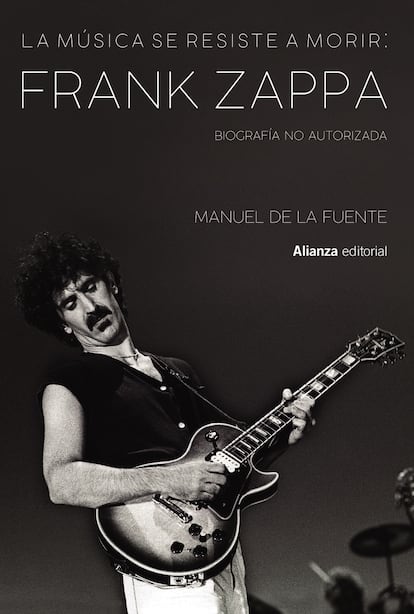Frank Zappa, in a recording studio in an undated image.Image provided by the family / EL PAÍS
We are grateful for the publication of
Music Resists to Die
(Alianza), the substantial biography of Frank Zappa (1940-1993) signed by Professor Manuel de la Fuente Soler.
You see: while Zappa's name is common knowledge, his music is still in limbo.
We might think that we have made little progress in understanding it: half a century ago, the Zappa poster sitting on a toilet decorated millions of more or less frank floors.
Frank became an icon of the counterculture when, in fact, he hated that movement and made it explicit in dozens of songs.
But, alas, we already know that the targets of satires often applaud, ignoring that the jester's finger is pointing at them.
More information
Frank Zappa, the great rock heterodox, dies
Zappa or sarcasm as one of the fine arts
It also happens that Zappa was a true offending machine. He was fiercely and systematically attacking the music industry, youth fashions, organized religion, Republican politicians, the mainstream family. To the triad of poop, fart, pee he added semen: crappy sex was an obsession and, of course, a very salable argument. He found a vein with the adventures of musicians and
groupies
; he went on to film a handful of them, the GTOs, later abandoned for breaking one of the Uncle Frank Rules (“no drugs”).
Zappa did not come into the world to win friends.
His was that lapidary description of the rock press: "People who cannot write, who interview people who cannot speak for the consumption of people who cannot read."
In truth, he considered himself a composer of contemporary music supported by his activities in rock.
In this field he demonstrated mastering a very broad palette, ranging from the
cute
fifties
doo wop
even a fast jazz-rock.
Honoring such a protean repertoire required disciplined, highly qualified and humorous musicians willing to renounce some of their rights (Zappa systematically converted his
live
recordings
in part of her official records) for the opportunity to serve under Mother Superior. Very jealous of his quarry, Frank chastised David Bowie for years for stealing the services of guitarist Adrian Belew. He did not tolerate labor demands: the brilliant trumpeter Sal Marquez was fired for requesting allowances when they played outside of Los Angeles. His lack of empathy for his employees, accentuated by the laxity of leaving the musical direction to a young bassist, led to the disintegration of his band in 1988, after his visit to Spain. He proclaimed that he would never hire instrumentalists again: he had bought a Synclavier, a synthesizer with a
sampler
that, he claimed, allowed him to play the most complex scores without errors. In timbral terms, that was not A Good Idea.
But it fit Zappa's radical individualism. It boasted a libertarian ideology, which in the American context amounts to demanding maximum personal freedom, minimal government presence, small taxes, and - a Zappa obsession - no unions. Although Frank also put red stripes: he was offered to run for president of the United States by the Libertarian Party, but he collided with the point of the program that defended the possession and use of firearms; there was no agreement.
De la Fuente is particularly scrupulous in Zappa's misty final years. After the fall of "real socialism" in Eastern Europe, he must temper his disdain for rock audiences: he discovers that, under repressive circumstances, it was more than just an entertainment option. Václav Havel tells it: his followers in Czechoslovakia could go to jail for playing music inspired by The Mothers of Invention. Raised to the category of a symbol of freedom and capitalism, it detects business opportunities in countries that are opening up to the market economy.
Opt for barter, something quite common in the communist bloc. The example to explain their business model: "In Spain there is a lack of trees, so the Spanish could send the Soviets meat and agricultural products in exchange for wood." He performs intermediary functions in different sectors without getting the commissions he expected. No surprise: visionaries don't usually get along with businessmen.
Contradicting his declared libertarian antipathy for the expansion of the role of governments and institutions, in 1988 and 1989 we see him pilgrimage through European cities (Milan, Madrid or Seville) trying to sell his projects. To the socialist mayor Juan Barranco he presents a kind of modern Bauhaus, which would generate from avant-garde cultural products to a graffiti remover liquid. Even knowing that Barranco had weeks left in the Plaza de la Villa, the image of the king of
freaks
trying to cajole municipal politicians with limited resources
produces sadness
.
She already suffers from embarrassing annoyances, initially attributed to her years of promiscuity.
In 1990, he was diagnosed with prostate cancer.
He does not see enough reason to stop: from his admired Edgar Varèse he took that motto that says "The composer of the present time refuses to die" (which also inspires the title of the volume by Manuel de la Fuente Soler).
For his part, he dedicates himself to preparing an extensive series of Zappian record releases that continue after his death, to the present day.
It is then impossible to guess the final destination of their base of operations: in 2016, with their children at the same time, their home-studio in Hollywood Hills is acquired by Lady Gaga.
Sic
transit gloria mundi.
Cover of 'Music resists to die', by Manuel de la Fuente Soler.Alianza Editorial / EL PAÍS

